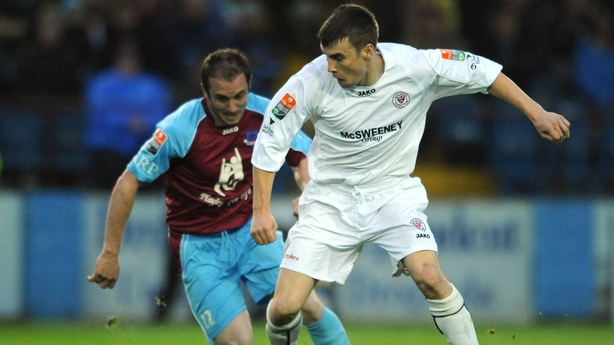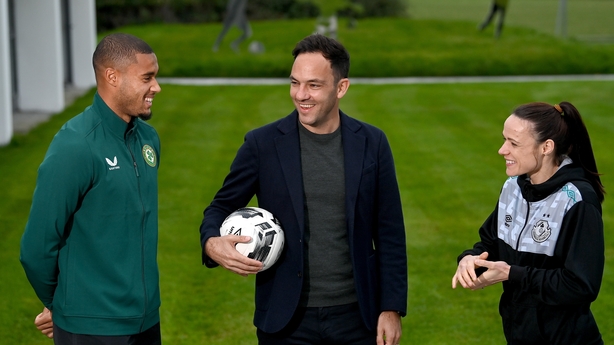At the unveiling of the pilot scholarship programme for developing Irish footballers, James McClean insisted that government support is required to improve the domestic league and the prospects of young footballers in this country.
McClean is one of a quintet of current and former Irish internationals - alongside Gavin Bazunu, Seamus Coleman, Kevin Long and Enda Stevens - who are funding a scholarship pilot scheme which will enable one 17-year old boy and one 17-year old girl to train full-time with their League of Ireland club while completing their Leaving Cert. The two chosen players will be paid a bursary of €15,000 each.
The grouping had originally raised the money - which is in excess of €30,000 - to help League of Ireland players experiencing difficulties during Covid. However, the vast majority of the fund wasn't drawn down and the players have agreed to put it instead towards the scholarship scheme.
The plan was the brainchild of former Ireland international Graham Barrett, agent to four of the players involved.
The FAI, the League of Ireland and the PFAI have backed the scheme, with the association's director of football Marc Canham saying the ultimate aim would be to create a scholarship for 10 boys and 10 girls across every League of Ireland club in five years time, adding "we obviously need investment to do that."
Bazunu, who made his breakthrough in the youth ranks at Shamrock Rovers, flew from Faro to FAI Headquarters on Tuesday as part of the announcement of the scheme, seated alongside Canham, with Republic of Ireland centurion Aine O'Gorman also partaking in the press conference.
McClean joined afterwards via zoom from his home in England. Having recently announced his international retirement, the Derryman, who played for his native club between 2008 and 2011 before departing for Sunderland, said the plan would bring benefits to both domestic league and the national team.
"The league is something that's very dear to the players involved, it's where we got our education," McClean told reporters over Zoom on Tuesday afternoon.
"We want to put it (the money) to a good cause, and help the league in some way and help the next generation.
"My view is if you've got a strong league, you'll end up having a strong national team - because a lot of players have come through the league to play for the national team.
"The aim at the minute is to get one girl and one boy. But the ultimate goal is to get a lot more. Get a proper scholarship programme where our young talent comes through, boys and girls, have the best facilities and the best access to get an education if the football doesn't work out.
"But they should have everything available to them to give them the best chance of making it professionally."
Now approaching the final stretch of his career, the 34-year old McClean has recently joined the Wrexham revolution in League Two, though found sobering the realisation that the facilities and infrastructure of fourth tier clubs in the English league was superior to that of Ireland's top tier.
"I am still a massive Derry City fan and Gavin (Bazunu) is huge Shamrock Rovers fan. Seamus keeps an eye on the Sligo and the Finn Harps results. We want the league to thrive and we want the young players to come through and thrive.

"If you look from when I left the league back in 2011 to now, nothing has really changed at all. You look at the development that young players get here in England. And it's no coincidence they [England] are doing so well.
"I am in League Two now but the facilities here are miles ahead of the League of Ireland. This is the third tier of the EFL and that is miles ahead of our domestic league, our Premier Division.
"And in 2023, that shouldn't be the case. Our domestic league back home should be stronger than what it is. I think that has always been an issue and I think it's held the national team back in a way."
Bazunu was the beneficiary of a similar-ish scheme, when Shamrock Rovers partnered with Ashfield College to allow the goalkeeper to train full-time at 15, while progressing towards his Leaving Cert.
"If you look at the change that Brexit has made with young players not being able to go over to the UK as early – at the moment that is a disadvantage because we have a lot of players who, at the age of 17, are stuck in a place where they cannot be as highly trained as they would be if they were to go to elite academies.
"But I believe we can turn that to our advantage, we can keep players here for longer, have them playing in our first teams, strengthen our league and make it a more competitive one."

Canham, speaking for the FAI, also emphasised the impact of Brexit in denying young Irish players access to the more advanced UK academies, during the critical ages of 16-19. He hailed the scholarship scheme.
"Brexit has significantly impacted the development of our young Irish high potential players and it is critical to increase the development time, both coaching and gametime, throughout the pathway. It's absolutely critical at the ages of 16 to 19.
"Football has changed exponentially over the last 10-20 years. The success of the domestic game in each country and the success of the international team has a direct correlation with the quality of the development system in any country."
As for the "investment" needed, Canham insisted that a number of avenues were being explored, the government being one obvious source. With a bursary of €15,000 being handed to each boy and girl, realising the vision of handing out 10 such scholarships at each League of Ireland club across men's and women's football would require a significant commitment.
The issue of government funding of football has cropped up increasingly in recent times, with outgoing chairperson Roy Barrett alleging there had been "chronic under-investment" in the game and criticising the situation whereby the vast bulk of the betting levy is hoovered up by the horse and greyhound racing industries.
McClean says he's open to lobbying the Irish government himself, though he doesn't expect to have to push too hard.
"We hope we don't have to convince them too much. It should be a really straightforward thing. It's something that's going to benefit our domestic league and hopefully benefit the national team in the process. It shouldn't really be a fight.
"We'll put the idea to them. We're hoping that they get on board with it. I don't see any reason why they shouldn't because it's got so many benefits to it. It should be non-negotiable.
"It shouldn't be our job to basically fund the league and make the league better. It should be a government funded thing anyway.
"It's a start from our end. It doesn't matter how it gets started. The FAI being involved is obviously massive. We're grateful to them. They can obviously take it to a new level. But we need government funding. And if we get that, I think the sky's the limit."
Listen to the RTÉ Soccer podcast on Apple Podcasts, Spotify or wherever you get your podcasts.
Watch Cork City v Shamrock Rovers in the League of Ireland on Monday on RTÉ2 and RTÉ Player, kick-off 7.30pm
